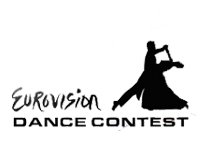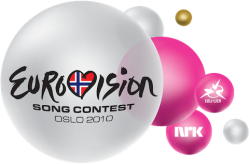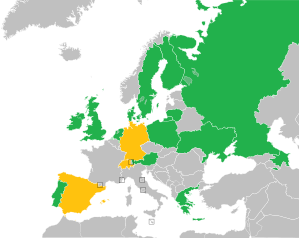
The Junior Eurovision Song Contest 2003 was the inaugural edition of the annual Junior Eurovision Song Contest for young singers aged eight to fifteen. It was held on 15 November 2003, in Copenhagen, Denmark. With Camilla Ottesen and Remee as the presenters, the contest was won by the then eleven-year-old Dino Jelusić, who represented Croatia with his song "Ti si moja prva ljubav" while second and third place went to Spain and the United Kingdom respectively. The next time that a country would win on its first attempt was Italy in 2014.

The Eurovision Dance Contest was an international ballroom dancing competition organised by the European Broadcasting Union (EBU) and the International DanceSport Federation (IDSF). The IDSF credits the existence of the contest to Richard Bunn of RBI network, Geneva, former EBU controller of sport, who convinced the EBU to create the programme.

The Eurovision Dance Contest 2007 was the inaugural edition of the Eurovision Dance Contest, a dance competition co-production between the European Broadcasting Union (EBU) and host broadcaster BBC. The first ever pan-European dance competition was held on 1 September 2007 in London, United Kingdom with the participation of 16 countries.
Azerbaijan debuted in the Eurovision Song Contest 2008 with the song "Day After Day" written by Govhar Hasanzadeh and Zahra Badalbeyli. The song was performed by Elnur and Samir. The Azerbaijani Eurovision entrant for the 2008 contest in Belgrade, Serbia was selected through Land of Fire 2008, organised by the Azerbaijani broadcaster İctimai Television (İTV). The final took place on 2 February 2008 and a fifteen-member jury selected Elnur Hüseynov as the winner. The song "Day After Day", performed in a duet with Samir Javadzadeh, was internally selected and announced on 8 February.

The Eurovision Song Contest 2009 was the 54th edition of the Eurovision Song Contest. It took place in Moscow, Russia, following the country's victory at the 2008 contest with the song "Believe" by Dima Bilan. Organised by the European Broadcasting Union (EBU) and host broadcaster Channel One (C1R), the contest was held at the Olimpiysky Arena, and consisted of two semi-finals on 12 and 14 May, and a final on 16 May 2009. The semi-finals were presented by Russian model Natalia Vodianova and television presenter Andrey Malakhov, while the final was presented by Russian television presenter Ivan Urgant and former Russian contestant Alsou Abramova, becoming the first and to date only time that two different sets of presenters had hosted the semi-finals and finals.
Finland participated at the Eurovision Song Contest 2009 with the song "Lose Control" written by Waldo, Karima, Ari Lehtonen and Annie Kratz-Gutå. The song was performed by the band Waldo's People. The Finnish broadcaster Yleisradio (Yle) organised the national final Euroviisut 2009 in order to select the Finnish entry for the 2009 contest in Moscow, Russia. 12 entries were selected to compete in the national final, which consisted of three semi-finals, a Second Chance round and a final, taking place in January 2009. Eight entries ultimately competed in the final on 30 January where votes from the public selected "Lose Control" performed by Waldo's People as the winner.
Andorra participated in the Eurovision Song Contest 2009 with the song "La teva decisió " written by Susanne Georgi, Rune Braager, Lene Dissing, Pernille Georgi, Marcus Winther-John and Josep Roca Vila. The song was performed by Susanne Georgi. The Andorran broadcaster Ràdio i Televisió d'Andorra (RTVA) organised the national final Passaport a Moscou in order to select the Andorran entry for the 2009 contest in Moscow, Russia. Three songs performed during the national final on 4 February 2009 where a combination of jury voting and public voting selected "La teva decisió " performed by Susanne Georgi as the winner.
Spain participated in the Eurovision Song Contest 2009 with the song "La noche es para mí" written by Irini Michas, Dimitri Stassos, Jason Gill and Felipe Pedroso. The song was performed by Soraya. The Spanish broadcaster Televisión Española (TVE) organised the national final Eurovisión 2009: El retorno in order to select the Spanish entry for the 2009 contest in Moscow, Russia. The national final consisted of three semi-finals and a final and involved 30 artists and songs. Ten entries ultimately qualified to compete in the televised final where an in-studio jury and a public televote selected "La noche es para mí" performed by Soraya as the winner.
Hungary participated in the Eurovision Song Contest 2009 with the song "Dance with Me" written by Zé Szabó and Kasai. The song was performed by Zoli Ádok. The Hungarian entry for the 2009 contest in Moscow, Russia was selected internally by the Hungarian public broadcaster Magyar Televízió (MTV). "If You Wanna Party" performed by Márk Zentai was initially announced as the Hungarian entry on 3 February 2009, however, the song was withdrawn on 4 February 2009 as it was presented in 2004 as the Swedish Big Brother theme song "We Became Friends". "Magányos csónak" performed by Kátya Tompos was announced as the replacement entry on the same day, however, the song was also withdrawn on 10 February 2009 and "Dance with Me" performed by Zoli Ádok was announced as the final replacement on 23 February 2009.
Montenegro participated in the Eurovision Song Contest 2009 with the song "Just Get Out of My Life" written by Ralph Siegel, Bernd Meinunger and José Juan Santana Rodríguez. The song was performed by Andrea Demirović, who was internally selected by the Montenegrin broadcaster Radio i televizija Crne Gore (RTCG) to represent the nation at the 2009 contest in Moscow, Russia. Andrea Demirović was announced as the Montenegrin representative on 23 January 2009, while her song, "Just Get Out of My Life", was presented to the public on the same day. This was the first time that the Montenegrin song was performed entirely in the English language at the Eurovision Song Contest.

The Eurovision Song Contest 2010 was the 55th edition of the Eurovision Song Contest. It took place in Oslo, Norway, following the country's victory at the 2009 contest with the song "Fairytale" by Alexander Rybak. Organised by the European Broadcasting Union (EBU) and host broadcaster Norsk rikskringkasting (NRK), the contest was held at the Telenor Arena, and consisted of two semi-finals on 25 and 27 May, and a final on 29 May 2010, tying with the 1999 edition for the contest hosted the latest. The three live shows were presented by Norwegian television presenters Erik Solbakken and Nadia Hasnaoui and singer Haddy N'jie.
Finland participated at the Eurovision Song Contest 2010 with the song "Työlki ellää" written by Timo Kiiskinen. The song was performed by the duo Kuunkuiskaajat. The Finnish broadcaster Yleisradio (Yle) organised the national final Euroviisut 2010 in order to select the Finnish entry for the 2010 contest in Oslo, Norway. 15 entries were selected to compete in the national final, which consisted of three semi-finals and a final, taking place in January 2010. Ten entries ultimately competed in the final on 30 January where votes from the public selected "Työlki ellää" performed by Kuunkuiskaajat as the winner.

The Eurovision Song Contest 2015 was the 60th edition of the Eurovision Song Contest. It took place in Vienna, Austria, following the country's victory at the 2014 contest with the song "Rise Like a Phoenix" by Conchita Wurst. Organised by the European Broadcasting Union (EBU) and host broadcaster Österreichischer Rundfunk (ORF), the contest was held at the Hall D of the Wiener Stadthalle and consisted of two semi-finals on 19 and 21 May, and a final on 23 May 2015. The three live shows were presented by Austrian television presenters Mirjam Weichselbraun, Alice Tumler and Arabella Kiesbauer, while the previous edition's winner Conchita Wurst acted as the green room host.
Spain participated in the Eurovision Song Contest 2010 with the song "Algo pequeñito" written by Jesús Cañadilla, Luis Miguel de la Varga, Alberto Jodar and Daniel Diges. The song was performed by Daniel Diges. The Spanish broadcaster Televisión Española (TVE) organised the national final Destino Oslo, La Gala de Eurovisión 2010 in order to select the Spanish entry for the 2010 contest in Oslo, Norway. Ten artists and songs selected through an Internet public vote competed in the televised show where an in-studio jury and a public televote selected "Algo pequeñito" performed by Daniel Diges as the winner.

The Junior Eurovision Song Contest 2012 was the tenth edition of the annual Junior Eurovision Song Contest. It took place at the Heineken Music Hall in Amsterdam, Netherlands on 1 December 2012. Dutch broadcaster AVRO was the host broadcaster for the event. For the second time the Netherlands hosted the contest, after hosting the contest in 2007 in Rotterdam. The show was hosted by Kim-Lian van der Meij for a second time, this time joined by Ewout Genemans. The motto for the contest was "Break The Ice".
Finland participated in the Eurovision Song Contest 2013 with the song "Marry Me" written by Krista Siegfrids, Erik Nyholm, Kristofer Karlsson and Jessika Lundström. The song was performed by Krista Siegfrids. The Finnish broadcaster Yleisradio (Yle) organised the national final Uuden Musiikin Kilpailu 2013 in order to select the Finnish entry for the 2013 contest in Malmö, Sweden. 12 entries were selected to compete in the national final, which consisted of two heats, a semi-final and a final, taking place in January and February 2013. Eight entries ultimately competed in the final on 9 February where the 50/50 combination of votes from a four-member judging panel and votes from the public selected "Marry Me" performed by Krista Siegfrids as the winner.
Spain participated in the Eurovision Song Contest 2014 with the song "Dancing in the Rain" written by Ruth Lorenzo, Jim Irvin and Julian Emery. The song was performed by Ruth Lorenzo. The Spanish broadcaster Televisión Española (TVE) organised the national final Mira quién va a Eurovisión in order to select the Spanish entry for the 2014 contest in Copenhagen, Denmark. Five artists and songs competed in the televised show where an in-studio jury and a public televote selected "Dancing in the Rain" performed by Ruth Lorenzo as the winner.
Azerbaijan participated in the Eurovision Song Contest 2014 with the song "Start a Fire" written by Stefan Örn, Johan Kronlund and Alessandra Günthardt. The song was performed by Dilara Kazimova. The Azerbaijani Eurovision entrant for the 2014 contest in Copenhagen, Denmark was selected through Böyük Səhnə, a talent show organised by the Azerbaijani broadcaster İctimai Television (İTV). Following three elimination shows and a final on 2 March 2014, a five-member jury selected Dilara Kazimova as the winner. The song "Start a Fire" was internally selected and presented to the public on 16 March.
Spain participated in the Eurovision Song Contest 2015 with the song "Amanecer" written by Tony Sánchez-Ohlsson, Peter Boström and Thomas G:son. The song was performed by Edurne, who was selected by Spanish broadcaster Televisión Española (TVE) to represent the nation at the 2015 contest in Vienna, Austria. Edurne was announced as the Spanish representative on 14 January 2015, while "Amanecer" were presented to the public as the Spanish entry on 1 March 2015.
Finland participated in the Eurovision Song Contest 2017 with the song "Blackbird" and performed by Lasse Piirainen and Leena Tirronen under the name Norma John. The Finnish broadcaster Yleisradio (Yle) organised the national final Uuden Musiikin Kilpailu 2017 in order to select the Finnish entry for the 2017 contest in Kyiv, Ukraine. Ten entries were selected to compete in the national final on 28 January 2017 where the 50/50 combination of votes from ten international jury groups and votes from the public selected "Blackbird" performed by Norma John as the winner.










